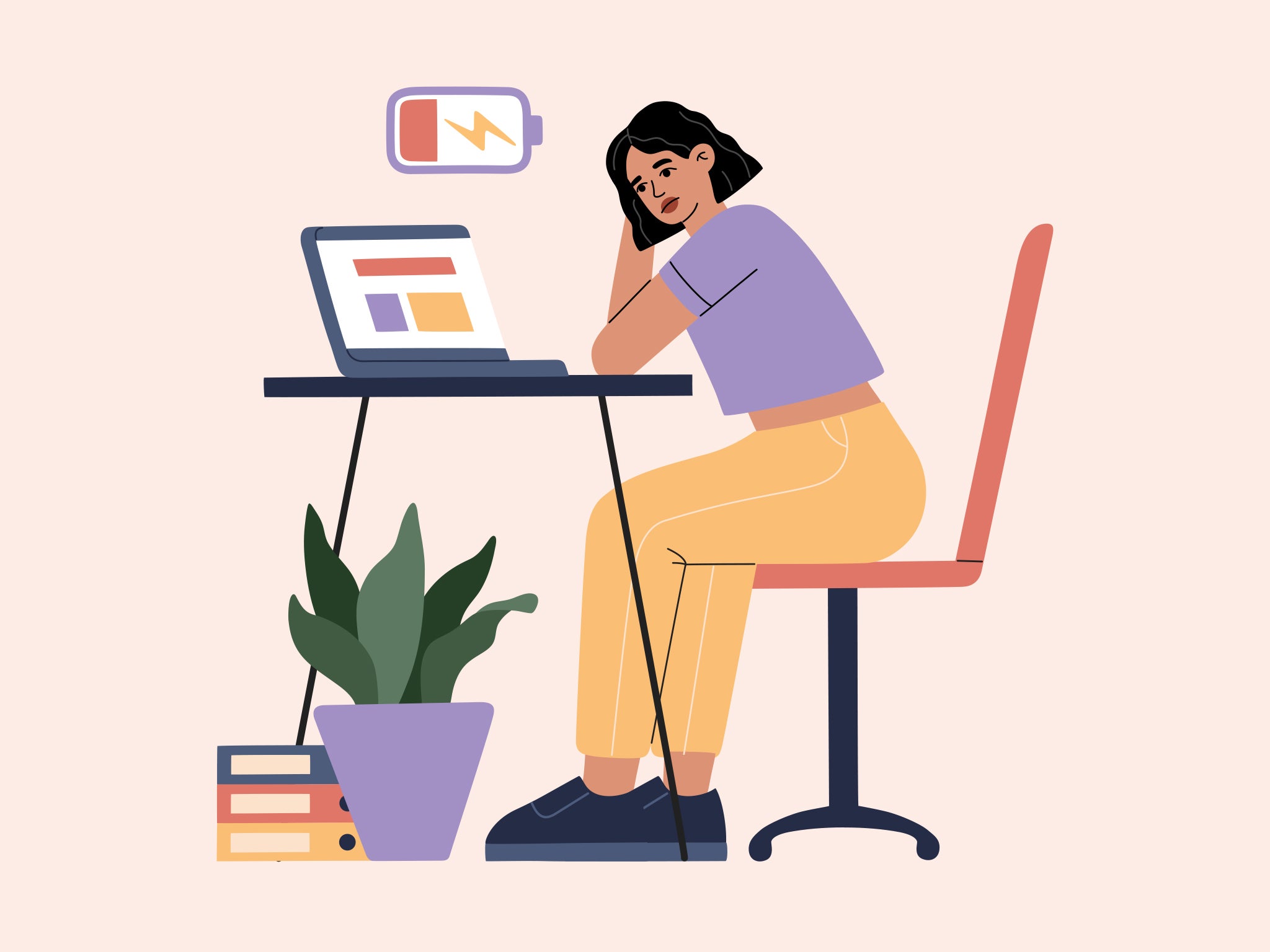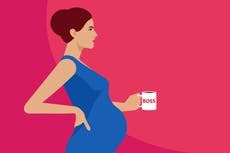What women want: Why we need to end workplace taboos on reproductive health
Lauren Crosby Medlicott speaks to women going through pregnancy, infertility and menopause about how their companies failed them, and how we can make it better


It’s no secret that women face challenges in the workplace resulting from changes in their bodies far beyond their control. PMT, menstruation, pregnancy, infertility, IVF and menopause bring with them a host of symptoms that may affect a woman’s ability to perform at the top of her game 24/7. Unfortunately, instead of being met with support in the workplace, she is often discriminated against, forgotten, whispered about, ignored, and made to feel like a second-class employee because she is a woman.
After seven years of climbing the career ladder in her PR agency, Annabel Lee became pregnant with her first child in 2016. “Everything was really positive until the six-week mark,” Annabel tells The Independent. “I started throwing up constantly from that point.”
Diagnosed with hyperemesis, Annabel was sick multiple times each day: on her commute, at work, in meetings. Even though she wasn’t keen to announce her pregnancy until 12 weeks, Annabel informed her boss she was pregnant at eight weeks to give her advance notice in case her sickness started to impact her work. “She was really supportive, pleased for me, and congratulatory,” Annabel says. Even though her boss didn’t directly discriminate against Annabel in any way, Annabel felt the weight of not being able to work as efficiently as she had before. “I felt out of control. I had been quite focused and driven at work, but when I was sick, that was beyond my control. I couldn’t fully focus on my career. Couldn’t go above and beyond. Couldn’t think about career progression.”
Even though her employer was understanding, Annabel found the lack of understanding about her condition hard to deal with. “Colleagues would ask if I had tried ginger or medication for my morning sickness,” the now 35-year-old recalls. “It was all upsetting when I had tried everything,” Annabel says it would have been helpful if there had been an understanding of her condition and a process to support women through pregnancy, especially when they acutely suffer with the side effects. If her employer had sat down and proactively asked Annabel what could have been done to support her, she would have felt less shame about the need to work remotely and flexibly during her pregnancy. “I didn’t want to give up completely – I wanted to work hard, but my body was literally telling me to stop.”
Annabel didn’t lose her job, but she felt judged and unsupported during one of the most vulnerable times of her life. Unfortunately, many women experience the same, and worse. A whopping 54,000 women a year in the UK lose their jobs as a direct result of pregnancy and maternity discrimination.
“And it gets worse,” Lauren Fabianski, of Pregnant Then Screwed, tells The Independent. “Only 1 per cent of those women take their case to tribunal because the system we have to fight this huge injustice is stacked against them. Additionally, studies have shown that women’s wages fall when they give birth to their first child, and they fall further with each child that she has; whereas men’s wages do not fall when they have children.”

If women aren’t directly discriminated against as a result of motherhood in the workplace, cultural norms implicitly impact them. With the second most expensive childcare system in the world, lack of flexible work options, and the burden of childcare still primarily on the mother, women who are pregnant and coming back from maternity leave will face barriers that make employment especially difficult.
But discrimination begins even before pregnancy. “We know that around a third of employers avoid hiring women of childbearing age for fear they will get pregnant on their watch,” says Fabianski. “This is invisible discrimination and very hard to identify as it happens during the recruitment process.”
Hannah* had climbed the ladder of success during her five years at a huge UK telecommunications company. During lockdown, she often worked 18-hour days, building up to managing a team of 75 employees. Even after finding out she was pregnant, Hannah continued pouring all her energy into her team before going on maternity leave in April 2021. She wasn’t worried about the repercussions her time out with her baby would have on her job.
But soon after the birth of her little girl, the company underwent a substantial restructuring and Hannah’s trusted line manager was transferred to another team. Hannah started to get anxious about the ramifications the changes could have on her career and hastily applied for five new roles when her baby was only months old. She only had an interview for one and didn’t hear back about the others, even though she had been one of the company’s most valuable employees.
“During the autumn of 2021, they were scrambling to map me into a role because our policy is that maternity leave should not impact you and that if you left a role, you should be given an equivalent one upon your return,” Hannah tells me. She returned in December 2021 with no position for her to fill. “They put me in a holding pattern because they didn’t know where else to put me. No one knew what to do with me.”
I asked why they hadn’t opened it internally. He replied that they just hadn’t thought about it. I’m not saying I deserved the role, but I deserved to apply for it
At the end of December, a new role as a director under her current managing director was approved by the recruitment team. “I thought it would have been perfect,” the 33-year-old remembers. “I’d been encouraged to apply for director roles as part of the talent programme I was included in.” She planned to apply after the Christmas holidays, but when she arrived back to work, it was announced the role had been filled by a friend of the managing director.
“They hadn’t even advertised the post internally, despite me not having a role,” Hannah says. “I asked why they hadn’t opened it internally. He replied that they just hadn’t thought about it. I’m not saying I deserved the role, but I deserved to apply for it.”
Hannah kept showing up for work but had still not been given a role in February 2022. “They had just forgotten about me,” she says, feeling like she had been betrayed by her employer. “I felt like I had fallen through the cracks because I hadn’t been there during my maternity leave.” Hannah started receiving fewer emails, was dropped from distribution lists, wasn’t told about meetings, and was left off the invites for events.
In February, she had a call with HR and became upset talking about what was going on. “He told me I seemed really upset, that he was worried for my mental health, and that I might still be too emotional following the birth,” Hannah recalls. “He essentially implied I was too postpartum depressed to have this conversation, rather than taking accountability. It had gotten to the point I felt like I was being gaslit about the whole thing.”
Hannah resigned from the job immediately following the meeting with HR and found another job she plans to begin in May.
Women who are pregnant, on leave with a new baby, or coming back from maternity leave shouldn’t have to fight against discrimination in the workplace or for the ability to continue in their employment. “They give birth to babies, not their competence,” Fabianski says with determination. “They have so much to contribute in their brilliant brains. Any woman that wants to work should be able to. We would never ask ourselves why we need to keep fathers in the workplace. It would be obscene.”

What about those women who struggle to get pregnant in the first place? In the UK, around one in six couples may struggle to conceive – that is around three and a half million people currently suffering from infertility. And yet, infertility is often stigmatised and silenced, leaving women to grieve and pursue fertility treatments without the support of their employers.
For 12 months over the course of 2014, Jodie Nicholson and her husband tried desperately to get pregnant. Her husband already had a daughter, leaving Jodie with a gut feeling it was her body that was the “broken” one, unable to give her the baby she longed for. After several tests, doctors diagnosed Jodie with polycystic ovaries and two collapsed fallopian tubes. “The diagnosis hit me really hard,” the now 31-year-old says. “Emotionally, I wasn’t in a good place at all. I was the lowest of the low. I actually took an overdose. I just had this overwhelming emotion I had failed as a woman and a wife. I just didn’t know how to process it all.”
At the time, Jodie was working as a school administrator at a high school. “I was off work for a good six months,” Jodie says. “I attempted to go back a couple of times, but I just couldn’t do it. I wasn’t coping and couldn’t concentrate. If you imagine a circle being your stress capacity, mine was already full with fertility stress. Any other thing added to it and I just overflowed.”
While Jodie loved her job and colleagues, she found the lack of validation about the grief she was going through disheartening. During her leave from work, four HR meetings were held, triggered by the absence management policy. Endless texts, emails, and phone calls to find out when she’d be returning. “I felt like I was in trouble for something that wasn’t my fault,” she says. “I remember one conversation with HR where I was told they couldn’t maintain my absence. I was just so angry.”
Jodie appreciates that from a business perspective, the school paid her sick leave and the salary of her replacement while she was away, but she craved validation about how difficult it was to come to terms with the fact she may never have children of her own.
He was just acutely embarrassed that I was even trying to have the conversation. He didn’t want to talk about it and didn’t believe I had been treated unfairly because of menopause
“I wasn’t asking for special treatment, but just someone to listen to me, to validate my experience and feelings,” says Jodie. “Not to feel punished for something beyond my control.”
Jodie went on to have a successful round of IVF and in 2020, she gave birth to a little girl.
“We have found a huge 38 per cent of people still consider leaving their workplaces when facing fertility issues,” Anya Sizer, of the Fertility Network, tells me. If people are struggling with infertility or undergoing IVF, they are often fearful of the repercussions on their jobs. “If we don’t fully support and recognise this issue we will see a workforce at best ‘just about managing’ and at worst leaving the workforce entirely.”
Siobhan Daniels was working as a reporter for a local news outlet when she found out she had precancerous cells and would have a hysterectomy to ensure they didn’t progress. The surgeon warned her the surgery would trigger menopause, but she didn’t expect just how severely menopause would impact every aspect of her life. “It just hit me like a bolt, it was horrible,” Siobhan says. “I started feeling really anxious and weepy. I lost all of my confidence, piled on weight, made excuses not to go out, and just felt like I was on the edge of my life looking in. I’d lie on the sofa for hours and hours, just in deep depression really.”

Despite the severe symptoms, Siobhan used every last ounce of her dwindling energy at work but found herself feeling increasingly ostracised as she struggled to remember names, facts, dates and tasks. “In the pressure of a news environment, you need to have your recall and your memory,” Siobhan says. “I would look stupid because I couldn’t remember things. One time, I was sitting next to my colleague I’d worked with for 10 years and suddenly couldn’t remember his name. Or my boss would ask me stuff and I couldn’t recall it. So my performance wasn’t good, but instead of getting support in the workplace, they started questioning my ability to do the job and there’s more pressure, leading me to become even more anxious. I felt like a broken woman.”
While not all women struggle with menopause in the workplace, some, like Siobhan, do. In 2019, it was found that around 900,000 women in the UK quit their jobs due to menopause. “Everyone’s menopause experience is unique but there are some aspects of menopause that can be particularly challenging for people transitioning through menopause whilst working,” explains Lesley Salem, founder of Over The Bloody Moon, an organisation supporting people to navigate menopause. Salem says some of the symptoms that affect women in the workplace most are thermo-regulation, poor sleep, brain fog, and joint pain, but these symptoms should not be reasons for women to feel forced out of the workforce.
“Menopause can and should be effectively managed through traditional or complementary medicine, and radical self-care,” encourages Salem. “But it is also the responsibility of the organisation and management to create menopause-friendly ecosystems. It shouldn’t be women who are having to choose to leave their jobs because of the failings of the company. We are in the midst of a menopause movement that is the birth of a new wave of feminism. We are demanding that the healthcare system, society, and the workplace properly respond to women’s needs and the UK is pioneering the way.”

Siobhan remembers tossing and turning as she slept at night, worrying about getting in trouble at work, but she was reluctant to share with her boss what was going on. “I didn’t dare talk about it because I felt it would be seen as weakness,” Siobhan recounts. “But there was a kind of whispering behind my back when I was having to take odd days off because I just couldn’t get out of bed.”
The one time she opened up to a male colleague about what she was going through, he dismissed her experience. “He was just acutely embarrassed that I was even trying to have the conversation. He didn’t want to talk about it and didn’t believe I had been treated unfairly because of menopause. I tried to tell him that this was my reality and how I felt but he just wasn’t receptive.”
By 60 years old, Siobhan simply wasn’t coping in the workplace. “I found myself crying every day, and just thought I’ve got to change this,” she remembers. “I can’t put up with this and need to retire early. I couldn’t go on any longer. I was desperate.” After 30 years in the workforce, Siobhan felt forced out because of menopause.
Now, two years later, Siobhan travels around Britain in a motorhome, passionately championing positive ageing.
Here’s the thing. If women continue to be ignored, left behind, gaslit, and discriminated against in the workforce, they will not back down and will demand their voices be heard. They are strong, intelligent, experienced, compassionate, creative, and innovative, but they shouldn’t have to use all those qualities to fight for their rights in the workforce simply because of their womanhood. Women will continue to rise, but it is necessary the culture shifts through employers, policies, and laws to ensure their rights are protected at work.
“We are demanding the healthcare system, society and the workplace properly respond to women’s needs,” says Salem. “We are going to see a rise and celebration of female power and leadership in business.”
*Name changed to protect identity
Join our commenting forum
Join thought-provoking conversations, follow other Independent readers and see their replies
Comments



Bookmark popover
Removed from bookmarks